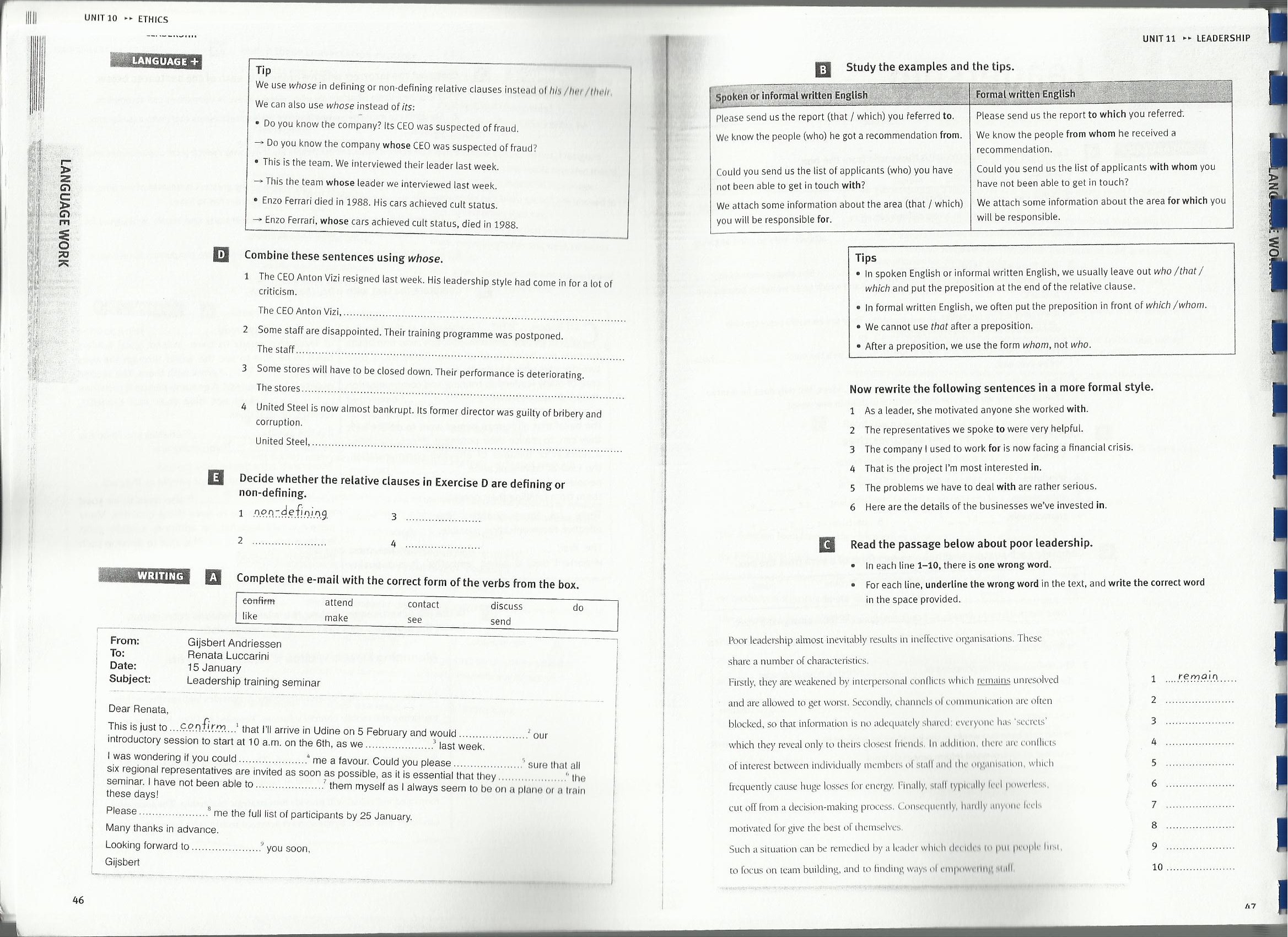cw0024

UNIT 10 ETHICS
UNIT 10 ETHICS
mnm
LANGUAGE WORK
Tip
We use whose in defining or non-defining relative dauses instead ol /1/5 /lwi / Ihah We can also use whose instead of its:
• Do you know the company? Its CEO was suspected of fraud.
—> Do you know the company whose CEO was suspected of fraud?
• This is the team. We interviewed their leader last week.
-* This the team whose leader we interviewed last week.
• Enzo Ferrari died in 1988. His cars achieved cult status.
-» Enzo Ferrari, whose cars achieved cult status, died in 1988.
Combine these sentences using whose.
1 The CEO Anton Vizi resigned last week. His leadership style had come in for a lot of criticism.
The CEO Anton Vizi.....................................................................................
2 Some Staff are disappointed. Their training programme was postponed.
The Staff...................................................................................................
3 Some Stores will have to be closed down. Their performance is deteriorating.
The Stores................................................................................................
4 United Steel is now almost bankrupt. Its fornrer director was guilty of bribery and corruption.
United Steel,.............................................................................................
B Decide whetherthe relative dauses in Exercise D are defining or non-defining.
1 ini.9.9. 3
2 ....................... 4 .......................
O
Complete the e-mail with the correct form of the verbs from the box.
|
confirm |
attend |
contact |
discuss |
do |
|
like |
make |
see |
send |
UJ Study the examples and the tips.
|
• Spoken or informal written English |
Formal written English | |
|
Please send us the report (that / which) you referred to. We know the people (who) he got a recommendation from. Could you send us the list of applicants (who) you have not been able to get in touch with? We attach some information about the area (that / which) you will be responsible for. |
Please send us the report to which you referred. We know the people from whom he received a recommendation. Could you send us the list of applicants with whom you have not been able to get in touch? We attach some information about the area for which you will be responsible. | |
Tips
• In spoken English or informal written English, we usually teave out who /that / which and put the preposition at the end of the relative clause.
• In formal written English, we often put the preposition in front of which/whom.
• We cannot use that after a preposition.
• After a preposition, we use the form whom, not who.
Now rewrite the following sentences in a morę formal style.
1 As a leader, she motivated anyone she worked with.
2 The representatives we spoke to were very helpful.
3 The company I used to work for is now facing a financial crisis.
4 That is the project Tm most interested in.
5 The problems we have to deal with are rather serious.
6 Here are the details of the businesses we’ve invested in.
|H Read the passage below about poor leadership.
• In eacli linę 1-10, there is one wrong word.
• For each linę, underline the wrong word in the text, and write the correct word
in the space provided.
Poor leadership almost inevitably results in ineffective organisations. Thesc share a nuniber of characteristics.
Firstly, they are weakened by interpersonal conflicts which remains iinresoived 1 .....Kf.hhPi.h.
and are allowed to get worst. Secondly, channels ul eominumeation are often 2 .................
blocked, so that information is no adec|uately shared: everyone has ‘sccrcts’ 3 .................
which they reveal only to theirs closest liiends. In addiiion, there are conllicts 4 ................
of interest between individually members ol stall and ihc organis.Ulon, which 5 ................
frcquently cause huge losses for energy. Finally, stall typu ally leel powerless, 6 ................
cut off 1'rom a decision-making proeess. Consequcntly, hurtlly aityoiu leels 7 ................
moticated for give the best ol ihemselvcs 8 ................
Such a situation can be remedied by a leader which dci ule , io put people Insi 9 ................
to focus on team buileling, and to linding ways ol empoWeiing stuli 10................
From:
To:
Datę:
Subject:
Wyszukiwarka
Podobne podstrony:
f4 10 Name:
00011 1e3324d2f6ed7ec009d60699a144186 10 Woodall & Faltin These statements are somewhat oversim
rośliny II (10) Ciemiężyca białaVeratrum album, A Jesl okazałą byliną dorastająca do 1,5 in wysokośc
SAVE0023 (10) I Posłuchaj nagrania ponownie i ułóż obrazki we właściwej kolejności.□ □□□□ 4 Który z
P1590156 10 10 Huków mą». i lit ntibail romoaomy XX. Hfat *ą JflljfHjfMl In pfef Wl»l«
10 123. The Problem of Sensitive and Critical Periods in Motor
mgr inż. HenrykBARTMAŃSKI* 21.08.1911 ■u- 13.10.2002st. wykładowca Politechniki Gdańskiej, prodzieka
crosa-sectional araes by 10 and 50%, and, finally, two struc-tural ełements in the mkłdle of the tel
10 KI. Brzozowski. P. Slrzemecki at weaning of young rabbits in the ex-perimental group.CONCLUSIONS
— 551 — cuivre — 10 a 20/1.000®8 de fer — 4 a 5/1.000e8 de plomb. Si un tel or etait fondu en lingot
Fig. 10 The Delft electric penetrometer tip (a) and the friction sleeve electric penetrometer t
674 UiN DEBAT : DES MENTADTTES
więcej podobnych podstron